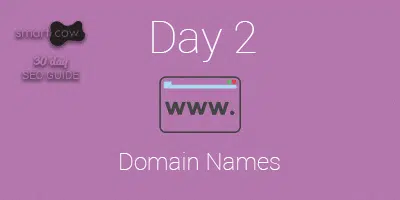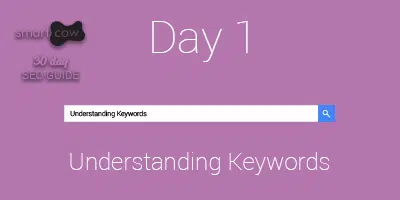A domain name is a unique name for a website. For example Smart Cow’s domain name is smartcowmarketing.com. The domain name serves as an address to access the website. When you visit a website, the domain name appears in the address bar of the web browser, it is often preceded by ‘www.’ but this isn’t part of the domain name. All domain names have a domain suffix also known as top-level domain (TLD) such as .com, .org, .net, .co.uk etc. the domain suffix helps identify what type of website it is, for example .org websites are used for non-profitable organisations, whereas .com is used for commercial websites. Second-level domain names (SLD) are also used, this is the portion of the domain name to the left of the “.” So the SLD for smartcowmarketing.com would be ‘smartcowmarketing’.
Without a domain name, you would still be able to access a web page, but you would have to type in a long string of numbers (IP address) this locates the website but isn’t very user friendly. A domain name provides a friendly and much more memorable alternative.
You can also use domain names for email addresses. There are many good free email providers such as Gmail, Hotmail, and yahoo. But if you’re looking for a username that is professional and personal to you or your business, it is becoming increasingly harder to find one that isn’t already taken, so you’ll most likely be left with something like ‘Jack16382@gmail.com’ this doesn’t look professional and it isn’t personal to you. Therefore buying your own domain name allows you to have an address that is much more specific to you or your business. For example you could have ‘yourname@yourcompany.com’ this is a much more approachable address for your business. There are many online services that let you create your own domain addresses for a website or email for a small price, usually per year.
One of the best reasons to purchase your own domain name is for security. One of the most popular reasons for buying your own domain name is to register your name or your company’s name regardless of whether you intend to use it or not. While this is a great reason to buy a domain name, it also protects you from other people trying to register your identity and trading off your identity.
Domain names have become increasingly valuable over the years as the ‘better quality’ domain names become registered. It is now incredibly rare to find a domain name of just one word that is in the dictionary. This means that if you’re lucky enough to find one, you could be sitting on a pot of gold as some domain names have sold for tens of thousands of pounds. Domain names have no limit on the price they’re sold at as it is completely down to the value it has to the buyer/seller. There is an increase in the popularity of random domain names so you can never tell if yours will be valuable.
Digital marketing Croydon
As a digital marketing agency in Croydon, we’re well placed to offer local businesses digital marketing services and online marketing advice.
Get in touch to chat about your business goals.



